
Index
Applications & Benefits of GAO’s RFID, BLE, IoT & Drones for Airport Construction
GAO Helps Customers Comply with Standards, Mandates & Regulations of Airport Construction
GAO Software Provides Easy Integration with API
Case Studies of RFID Applications
Overview
The airport construction industry involves the planning, design, and construction of airports and related infrastructure. It encompasses a range of activities, including site selection, runway, and terminal construction, installation of air traffic control systems, and development of ancillary facilities such as parking lots and cargo handling areas. The industry also involves various stakeholders, including government agencies, airport authorities, construction firms, engineering consultants, and equipment suppliers.
GAO’s RFID, BLE, IoT, and drone technologies have helped its customers in the airport construction Industry to improve their work processes, their operations, and productivity through better management of their staff, materials, and operational equipment such as excavators, loaders, bulldozers, graders, cranes, pavers, compactors, concrete mixers and pumps, trenchers, surveying equipment, air compressors, dump trucks, concrete saws, aerial work platforms, material handling equipment.
Ranked as one of the top 10 global RFID suppliers, GAO RFID Inc. is based in New York City, U.S., and Toronto, Canada. GAO offers a comprehensive selection of UHF, HF (including NFC), and LF RFID (radio frequency identification) readers and tags, BLE (Low Energy Bluetooth) gateways and beacons, and various RFID and BLE systems such as people tracking, asset tracking, access control, parking control, fleet management, WIP (work in progress), traceability. Such RFID and BLE products and systems, as well as IoT and drone technologies, have been successfully deployed for airport construction.
Applications & Benefits of GAO’s RFID, BLE, IoT & Drones for Airport Construction
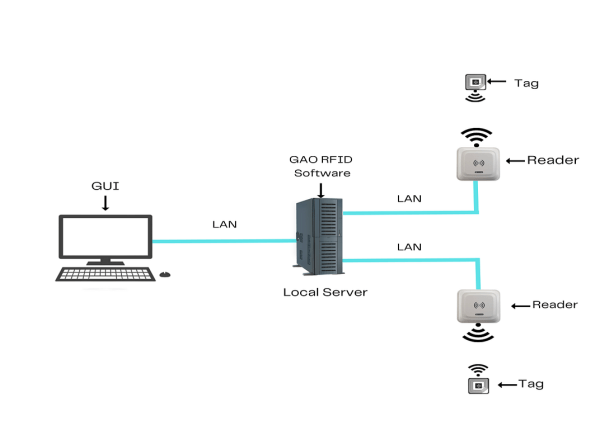
To satisfy its customers, GAO’s RFID or RFID Systems for the airport construction industry are offered in 2 versions. One version is that its software is running on a local server that normally is on our client’s premise, and another version runs in the cloud. The cloud server could be GAO’s cloud server, the client’s own cloud server, or a cloud server from one of the leading cloud server providers such as Amazon Web Services (AWS), Microsoft Azure, Google Cloud, IBM Cloud (formerly SoftLayer), Oracle Cloud, RedHat, Heroku, Digital Ocean, CloudFlare, Linode and Rackspace. The above illustrates the GAO system for the airport construction industry with its software running on a local server
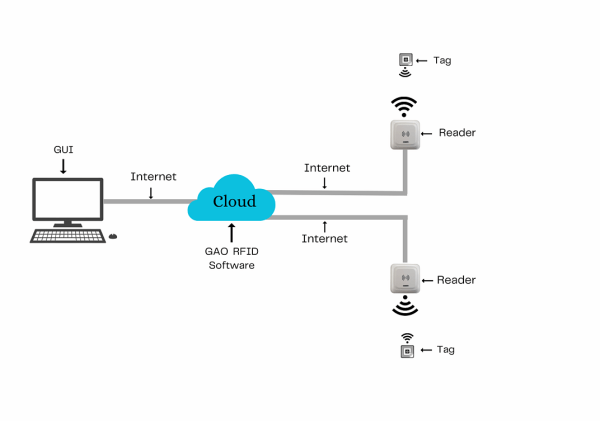
The above illustrates the GAO system for airport construction with its software running in the cloud.
GAO’s RFID and BLE technologies bring many benefits to the airport construction industry:
- Enhanced Asset Management: GAO RFID’s advanced tracking systems can help efficiently manage airport construction assets such as construction materials, tools, and equipment. By attaching RFID tags or BLE beacons to these items, our technology enables real-time tracking, ensuring their proper allocation, minimizing loss, and improving overall inventory management.
- Improved Worker Safety: GAO RFID solutions can enhance safety protocols at construction sites. By equipping workers with RFID-enabled identification badges or wearable devices, their movements and locations can be tracked in real-time. In case of emergencies or accidents, immediate identification and location information can aid in swift response and assistance.
- Streamlined Construction Material Handling: Our RFID technology can automate the process of material tracking and inventory management, reducing human errors and labour-intensive tasks. RFID tags attached to construction materials can enable automated identification, ensuring accurate supply chain management, reducing delays, and preventing material shortages.
- Efficient Tool Management: GAO RFID’s tool tracking solutions can optimize the use and maintenance of construction tools. RFID tags or BLE beacons can be attached to tools, enabling automatic check-in/check-out procedures, reducing theft, improving tool utilization, and enhancing maintenance scheduling.
- Enhanced Equipment Maintenance: RFID technology can streamline equipment maintenance in airport construction projects. By attaching RFID tags to machinery, vehicles, and equipment, our solutions enable proactive maintenance scheduling based on usage data and automate equipment inspections, resulting in reduced downtime and improved operational efficiency
GAO’s RFID and drone technologies are often combined, and such solutions offer the following benefits to airport construction industry:
- Enhanced Asset Tracking: By integrating RFID tags with drones, GAO RFID enables automated and accurate asset tracking in airport construction projects. Drones equipped with RFID readers can quickly scan and locate tagged construction materials, tools, and equipment, providing real-time visibility and minimizing manual search efforts.
- Efficient Inventory Management: Our RFID technology, when combined with drones, revolutionizes inventory management in airport construction. Drones equipped with RFID readers can perform rapid inventory scans, collecting data on available materials and supplies. This data can be instantly synchronized with the central database, allowing for efficient replenishment planning, reducing stockouts, and optimizing resource allocation.
- Rapid Site Surveys and Inspections: Drones integrated with RFID technology can expedite site surveys and inspections in airport construction projects. By equipping drones with RFID readers, GAO RFID enables automated identification and location tracking of various elements on the construction site, such as structures, materials, or safety equipment. This streamlines the data collection process, enabling faster and more accurate assessments..
- Improved Safety and Security: Integrating RFID with drones enhances safety and security measures at airport construction sites. Drones equipped with RFID readers can conduct regular site patrols, monitoring access points and identifying any unauthorized personnel or vehicles. This proactive surveillance helps prevent potential security breaches, ensuring a safer working environment.
Here are the benefits of GAO’s IoT technologies to the airport construction industry:
- Remote Monitoring and Control: GAO’s IoT technology allows for remote monitoring and control of construction activities. Project managers can access real-time data and remotely monitor progress, track inventory levels, and manage equipment and materials.
- Improved Asset Management: Our IoT-enabled asset tracking systems can provide accurate and real-time information about the location, condition, and usage of construction equipment, tools, and materials.
- Streamlined Construction Processes: Our IoT devices and connectivity enable the integration and automation of various construction processes.
GAO Helps Customers Comply with Standards, Mandates & Regulations of Airport Construction
GAO RFID Inc. has helped many companies in airport construction to deploy RFID, BLE, IoT, and drone systems and to ensure such deployments comply with the applicable industry standards, mandates, and government regulations:
RFID, BLE, IoT, & Drone Standards & Mandates
- ISO 18000-7
- ISO 18000-6C
- IATA Resolution 753
- Bluetooth Core Specification
- iBeacon
- IEEE 802.15.4
- MQTT (Message Queuing Telemetry Transport)
- FAA Part 107
- EUROCAE ED-234
US Government Regulations for Airport Construction Industry:
- Environmental Protection Agency (EPA) Regulations
- Occupational Safety and Health Administration (OSHA) Regulations
- Department of Transportation (DOT) Regulations
- Army Corps of Engineers (USACE) Regulations
Canadian Government Regulations for Airport Construction Industry:
- Transport Canada Regulations
- Canadian Environmental Assessment Act (CEAA)
- Provincial and Territorial Regulations
- Occupational Health and Safety Regulations
GAO Software Provides Easy Integration with API
GAO’s RFID and BLE software offers a free trial for both the server-based and cloud versions and offers an API to the important systems in airport construction such as:
Personnel Management:
- Labor Scheduling and Resource Allocation
- Safety Training and Compliance
- Employee Performance and Evaluations
- Payroll and Compensation Management
Equipment Management:
- Asset Tracking and Maintenance
- Equipment Utilization Optimization
- Fuel and Energy Management
Access Control:
- Secure Site Access
- Visitor Management
- Biometric Access Systems
Warehouse Management:
- Inventory Tracking
- Stock Control and Replenishment
- Order Fulfilment and Shipping
Supply Chain Management:
- Supplier Relationship Management
- Demand Forecasting
- Logistics Optimization
Other Applications:
- Project Management and Collaboration
- Quality Control and Inspection
- Environmental Compliance and Reporting
GAO has integrated its RFID, BLE, IoT, and drone systems with some of the leading software and cloud services in the airport construction industry. Below are some of the popular software and cloud services in the airport construction industry SAP SuccessFactors, B2W Maintain, Oracle HCM Cloud, Trimble Asset Management, Brivo ACS, JDA (Blue Yonder) Supply Chain Management, Amazon Web Services (AWS) Identity and Access Management (IAM), Microsoft Dynamics 365 Supply Chain Management, Aconex, Procore, Google Cloud Platform (GCP), and IBM Cloud.
GAO has worked with some of the leading technology companies in airport construction to provide integrated RFID, BLE, IoT, and drone solutions to customers. Here are some of the technology leaders in the airport construction industry Siemens, Honeywell, Cisco Systems, Bentley Systems, Thales Group, Raytheon Technologies, Bosch Security Systems, Johnson Controls, Rockwell Collins, Vanderlande, Leidos, and BEUMER Group.
Case Studies of RFID Applications
Below are some RFID application cases in the airport construction industry:
Zebra Technologies Corporation’s RFID solutions are equipped with active and passive RFID tags, beacons, and other tracking devices to locate, track, manage, and optimize high-value assets, equipment, and people. The company offers a range of scalable RFID technologies that generate precise, on-demand information about the physical location and status of high-value assets.
Honeywell International Inc: The RFID system deployed by Honeywell allowed DFW to track and manage critical assets, such as equipment, vehicles, and tools, more efficiently. RFID tags were affixed to assets, and RFID readers were strategically placed throughout the airport. This enabled real-time asset visibility and provided accurate location information, reducing the time spent searching for assets and improving operational efficiency.
Avery Dennison Corporation: The Retail Branding and Information Solutions (RBIS) segment offers branding solutions, including creative services, brand embellishments, graphic tickets, RFID inlays, tags, and labels; and packaging solutions, which the company markets to retailers, apparel manufacturers, and brand owners. The RBIS information solutions include item-level RFID solutions; visibility and loss prevention solutions; price ticketing and marking solutions; care, content, and country of origin compliance solutions; and brand protection and security solutions.
Alien Technology Corporation: Our readers are built for challenging environments that are representative in the real world. They are robust, tough, and high-performance even in the most challenging conditions. Our readers are different. They have advanced “filtering” and “intelligence” that competitors do not possess. This benefits you with less network traffic, fewer additional pieces of network equipment, and lower setup and maintenance costs.
Times-7: The Slimline A6020 is the latest generation portal system for conveyor belt-based UHF RFID applications. Easily installed into existing infrastructure, the A6020 incorporates a high-performance, ultra-low profile under belt antenna, plus three low-profile antennas positioned side and top of a conveyor to create a high-performance RFID portal. With a highly focused and balanced field, the A6020 is optimized to read RFID tags directly on, or close to, the conveyor with incredible accuracy.
Omni-ID: Omni-ID Exo 800 is a long-range passive UHF RFID tag capable of reading on, off, and near metal surfaces. Designed in a surprisingly small form factor, the Omni-ID Exo 800 features a rugged design for long-term use in outdoor and industrial environments. New to the Exo 800 is a customization option for a transparent tag that provides full protection for printing within the tag case.
Many applications of RFID by GAO can be found here
Passenger Transport Industry RFID solutions
Case Studies of IoT Applications
Below are some IoT application cases in the airport construction industry.
SFO implemented an IoT-enabled smart lighting system throughout its construction site. The system utilized sensors to adjust lighting levels based on natural daylight and worker presence, optimizing energy consumption and enhancing worker safety during nighttime operations. The solution resulted in a 30% reduction in energy usage and improved construction site visibility.
DFW integrated IoT sensors with their construction equipment, including cranes and forklifts. The IoT platform monitored equipment usage, fuel levels, and maintenance needs in real-time, enabling proactive maintenance scheduling and efficient equipment utilization. This resulted in a 20% reduction in equipment downtime and significant cost savings.
LAX employed IBM’s IoT platform to monitor air quality, noise levels, and temperature on its construction site. The real-time data helped LAX implement measures to reduce environmental impacts and ensure a healthy and safe working environment for construction workers.
YYZ partnered with Bell Canada to implement a comprehensive IoT solution for asset tracking and management. The airport attached IoT-enabled RFID tags to construction materials and equipment, allowing real-time tracking and efficient inventory management. The solution resulted in a 25% reduction in material losses and improved construction progress tracking.
YVR collaborated with Cisco to deploy IoT-enabled surveillance cameras across its construction site. The cameras are integrated with AI-based analytics to detect security breaches, unauthorized access, and potential safety hazards. The solution enabled the airport’s security team to respond promptly to incidents and prevent potential threats.
YYC utilized Schneider Electric’s IoT solutions for energy management during its terminal expansion project. IoT sensors were integrated into lighting and HVAC systems, optimizing energy consumption based on occupancy and environmental conditions. The implementation resulted in a 15% reduction in energy costs and contributed to the airport’s sustainability initiatives.
Case Studies of Drone Applications
Below are some drone application cases in the airport construction industry.
Denver International Airport (DEN) utilized drones equipped with LiDAR technology to conduct aerial surveys of the airport’s construction site. The drones captured detailed 3D data, allowing for precise topographic mapping and earthwork volume calculations. The use of drones reduced surveying time by 60% and improved construction site visualization, leading to more efficient planning and execution.
Hartsfield-Jackson Atlanta International Airport (ATL) employed drones with high-resolution cameras and thermal imaging capabilities to inspect the runway and taxiway surfaces during construction. The drones identified potential cracks, surface damages, and foreign object debris (FOD), ensuring the highest safety standards for aircraft operations.
San Francisco International Airport (SFO) integrated drones into its construction management process to monitor the progress of terminal expansion projects. The aerial footage provided real-time updates on construction milestones and helped identify potential delays and bottlenecks. This allowed the airport’s project management team to make informed decisions and ensure on-time project delivery.
Toronto Pearson International Airport (YYZ) employed drones equipped with advanced sensors to conduct environmental impact assessments during the expansion of its cargo handling facilities. The drones surveyed the surrounding areas, monitoring wildlife habitats and vegetation health to ensure compliance with environmental regulations.
Vancouver International Airport (YVR) utilized drones with specialized thermal cameras to inspect the airport’s airfield lighting systems. The drones identified malfunctioning lights and potential electrical issues, allowing for proactive maintenance and minimizing downtime for the lighting systems.
Calgary International Airport (YYC) deployed drones with high-definition cameras to inspect the construction of its new air traffic control tower. The drones captured detailed imagery of the tower’s structure, facilitating precise assessments of construction quality and adherence to safety standards.
GAO RFID Systems & Hardware for the Airport Construction
GAO RFID Inc. offers the largest selection of BLE gateways, BLE beacons, RFID readers, tags, antennae, printers, and integrated RFID systems for various industries, including airport construction.
as well as versatile beacons with such important functions as temperature, humidity, vibration, and panic button:
GAO’s BLE technology is suitable for many industries, including airport construction.
UHF (Ultra High Frequency) RFID
GAO offers the largest selection of UHF RFID readers for various industries, including airport construction:
GAO RFID offers the widest choice of UHF RFID tags, labels, badges, and wristbands for various industries, including airport construction:
and an array of antennas to address different applications:
HF (High Frequency), NFC (Near Field Communications), and LF (Low Frequency) RFID
GAO offers the largest selection of HF, NFC, and LF RFID readers for various industries, including airport construction:
HF, NFC, and LF RFID tags, labels, badges, and wristbands for various industries, including airport construction:
and antennas:
GAO also offers RFID printers:
Digital I/O adapters:
and relay controllers:
For embedded applications, GAO offers UHF, HF and LF RFID reader modules:
The RFID systems by GAO are highly popular for clients in airport construction:
People or workers tracking system:
Physical asset or operational equipment tracking system:
Personnel or people access control system:
Parking or vehicle control system:
GAO Has Served Airport Construction Extensively
GAO’s products and technologies have helped its customers in airport construction to achieve success in sustainability, smart airports, passenger experience, biometrics, modular construction, digital twin, airport connectivity, sustainable aviation fuel (SAF), airside efficiency, resilience, and adaptability.
GAO RFID Inc. has deployed RFID, BLE, and IoT projects for many companies in airport construction, including many in its various divisions such as:
- Terminal Construction: This division focuses on the construction of airport terminals, including passenger terminals, concourses, check-in areas, baggage handling systems, security checkpoints, retail and dining areas, and other terminal facilities.
- Runway and Apron Construction: This division involves the construction of airport runways, taxiways, and aprons, including pavement construction, lighting systems, navigation aids, and other infrastructure required for aircraft operations.
- Airside Infrastructure Construction: This division encompasses the construction of airside facilities, such as hangars, maintenance, and repair facilities, fueling stations, de-icing facilities, cargo handling facilities, and other specialized infrastructure for aircraft servicing and operations.
- Landside Infrastructure Construction: This division includes the construction of landside facilities and infrastructure, such as access roads, parking structures, passenger drop-off and pick-up areas, rental car facilities, public transportation terminals, and other facilities that support ground transportation and passenger connectivity.
- Security Infrastructure: This division focuses on the construction of security-related infrastructure within airports, including perimeter fencing, access control systems, surveillance systems, security checkpoints, and other facilities aimed at enhancing airport security measures.
- Air Traffic Control Infrastructure: This division involves the construction of air traffic control towers, communication and navigation systems, radar systems, and other infrastructure required for air traffic management and control.
- Airport Planning and Design: This division involves the planning, architectural design, and engineering of airports, including master planning, site development, infrastructure layout, terminal design, runway design, and other design-related services.
Here are some of the leading companies in airport construction industry:
- Turner Construction Company: An American construction company known for its diverse range of projects, including commercial, healthcare, education, and transportation. Turner Construction has a global presence and is involved in major construction projects worldwide.
- Balfour Beatty US: A subsidiary of the UK-based Balfour Beatty plc, this construction company operates in the United States, specializing in general contracting, design-build, and construction management services across various sectors.
- Granite Construction Incorporated: A heavy civil construction company based in the United States, known for its expertise in infrastructure projects, including roads, highways, bridges, and water-related projects.
- Kiewit Corporation: One of the largest construction and engineering firms in North America, Kiewit is involved in a wide range of projects, including transportation, energy, mining, and water infrastructure.
- Bechtel Corporation: A global engineering, construction, and project management company that operates in various sectors, including energy, transportation, and infrastructure.
- Hensel Phelps Construction: A construction company that offers general contracting, construction management, and design-build services across different industries, including commercial, aviation, and healthcare.
- Whiting-Turner Contracting Company: A general contracting and construction management firm that undertakes projects in sectors such as healthcare, education, and commercial construction.
- Hunt Construction Group: A company specializing in sports facility construction, stadium renovations, and other large-scale commercial projects.
- Swinerton: A general contracting and construction services company with a focus on commercial, hospitality, and healthcare projects.
- Gilbane Building Company: A construction and real estate development company that operates in the United States and internationally, specializing in commercial, healthcare, and educational projects.
- The Walsh Group: A construction firm that handles various types of projects, including infrastructure, transportation, and water treatment facilities.
- Austin Industries: A construction company with expertise in heavy industrial, commercial, and transportation projects in the United States.
- Webcor Builders: A California-based construction company known for its involvement in commercial, healthcare, and residential projects.
- Clark Construction Group: A company that provides construction and project management services for various sectors, including commercial, residential, and infrastructure.
- Skanska USA: The American arm of the global construction company Skanska, is known for its construction and development projects in various sectors.
- Tutor Perini Corporation: A civil and building construction company with a diverse portfolio of projects, including transportation, healthcare, and hospitality.
- McCarthy Building Companies: A construction company that specializes in healthcare, education, and commercial construction projects.
- PCL Construction Enterprises: A group of independent construction companies operating across North America with expertise in various sectors, including infrastructure and buildings.
- Ledcor Group: A construction company involved in various sectors, including infrastructure, mining, and residential construction.
- Axiom Builders: A Canadian-based construction company offering general contracting and construction management services in various sectors.
- Eastern Construction Company Limited: A Canadian construction company with a focus on commercial and institutional projects.
- Bird Construction: A Canadian company providing general contracting, construction management, and design-build services for various projects.
- Gillam Group Incorporated: A Canadian construction company involved in residential and commercial projects.
- Graham Construction: A Canadian construction company specializing in various sectors, including infrastructure, commercial, and industrial projects.

Turner Construction Company

Balfour Beatty US
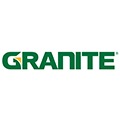
Granite Construction Incorporated
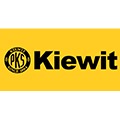 Kiewit Corporation
Kiewit Corporation

Bechtel Corporation

Hensel Phelps Construction

Whiting-Turner Contracting Company
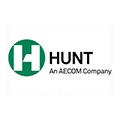
Hunt Construction Group

Swinerton

Gilbane Building Company

The Walsh Group

Graham Construction
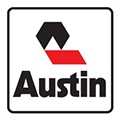
Austin Industries

Webcor Builders

Clark Construction Group
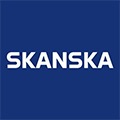 Skanska USA
Skanska USA

Tutor Perini Corporation
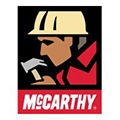
McCarthy Building Companies

PCL Construction Enterprises

Ledcor Group

Axiom Builders

Eastern Construction Company Limited
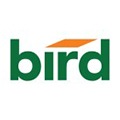
Bird Construction
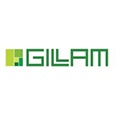
Gillam Group Incorporated
